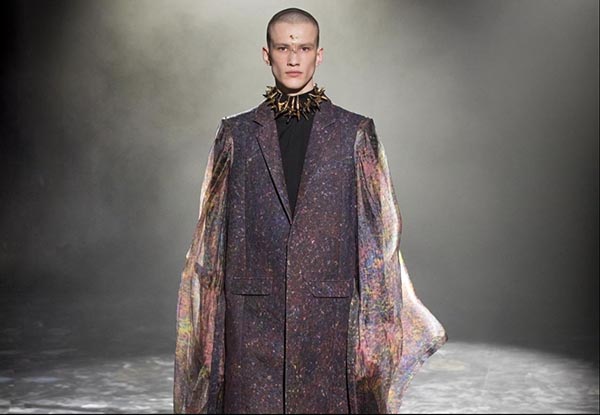
(Image courtesy of Texintel)
Paris has long been the epicenter of the fashion industry and presents a global showcase for creativity, talent, and innovation.
Japanese designer Yuima Nakazato chose Paris to launch his latest collection for Spring/Summer 2023. The launch highlights Nakazato’s vision for the fashion industry and, in partnership with Epson, he once again utilized the latest innovations and technologies to manufacture his ground-breaking fashion collections.
Nakazato explained, “As a designer, I want to use technology to maximize my creativity whilst also improving the environmental impact of the garments I create. I am very passionate about my research and exploring how technology can make a positive impact on fashion.”
Technology has been entwined with Nakazato-san’s creativity from the onset of his career. Born of creative parents, he was the youngest Japanese graduate to study at the world-renowned fashion school, Royal Academy of Fine Arts Antwerp. Nakazato has won many awards: the Innovation award by Ann Demeulemeester, one of the Antwerp Six, for his master’s course graduation collection. He participated in and won awards at the Diesel-sponsored International Talent Support (ITS) fashion competition held in Italy, the largest fashion contest in the world, in both 2008 and 2009. Shoe designs created during his study at the Royal Academy were put into the Antwerp Mode Museum (MoMu) for permanent preservation.
He instinctively questions the norm and seeks to deliver garments that enhance the life of the wearer while seeking to improve the environmental impact of the fashion Industry and ultimately to democratize couture. His work symbolizes the reform of apparel—where design and materials combine to deliver a biophilic experience, nurturing the body and the planet simultaneously.
Nakazato has carved a new pathway for the future of the fashion Industry, his latest collaboration with Epson delivers ground-breaking garments manufactured using Epson’s equally ground-breaking sustainable technologies. “Technology is very important for the future of the fashion Industry; it’s very important to consider and explore sustainable solutions. My partnership with Epson has allowed me to innovate, without losing creativity, to deliver reimagined garments using environmentally secure technology,” added Nakazato.
Beginning with materials, Nakazato reclaimed 150kg of waste from a landfill in Africa. Africa represents the depository for the waste of the West; Greenpeace says that “150–200 tons of textiles a day finds its way to African countries as waste; and with up to 69% of the fibers used in clothes synthetic (mainly polyester), they are therefore oil-based and non-biodegradable.”
Circular design is at the heart of Nakazato’s vision and therefore utilizing waste materials remains a priority for his brand.
The recovered textiles were recycled using Epson Dry-Fibre technology. Epson then applied its dry fiber process to produce over 50 meters of new re-fiberized non-woven fabric, some of which was used for printing with pigment inks with Epson’s Monna Lisa digital printing technology.*
Hitoshi Igarashi from Epson’s Printing Solutions Division explains the importance of the technology: “Although in its early stages, Epson believes its dry fiber technology combined with pigment ink digital printing could offer the fashion industry a much more sustainable future, significantly reducing water use while allowing designers the freedom to fully express their creativity.
“Epson’s Environmental Vision is committed to contributing to a circular economy, and this development could be one step towards achieving this. Dry fiber technology applied to the fashion industry offers the possibility of producing material for new clothes that have been recycled from used garments.”
In a trial of distributed printing for venue decoration, Epson inkjet printers in Japan and France, with remote support from Epson engineers, were used to create decorations in the venue space. The results demonstrate the power of digital printing technology for on-demand manufacture.
Collaboration between the manufacturing community and the fashion industry is paramount to the success and reform of the fashion supply chain. Designers are primed to push boundaries, and Epson has a renowned history in delivering innovation that drives systemic reform. As we approach the implementation of regulatory practice, circular design must be implemented at creation. To deliver this practically, knowledge transfer is now a key factor in the successful implementation of a circular economy.
Epson’s partnership with Yuima Nakazato represents a powerful strategic collaboration for the future of fashion production.
In summary, as innovation continues to evolve, Nakazato’s passion and environmentally conscious fashion label spotlight a new pathway for couture while Epson’s continued innovation underpins production technology to deliver sustainable manufacturing solutions that secure a bright future for the fashion Industry.
*Digital textile printing using pigment inks offers a more sustainable approach to the fabric production process compared with traditional analog methods. In addition to pigment inks requiring significantly less water, the digital process requires far fewer stages and is less complex. Unlike analogue, it requires no plate production, washing or storage, results in little disposal of used inks, and allows on-demand production that contributes to less waste. Epson’s Monna Lisa digital direct-to-fabric printers use less water compared with analogue methods. Pigment inks are more eco-friendly. Epson GENESTA pigment inks are GOTS approved by ECOCERT.















Discussion
Only verified members can comment.